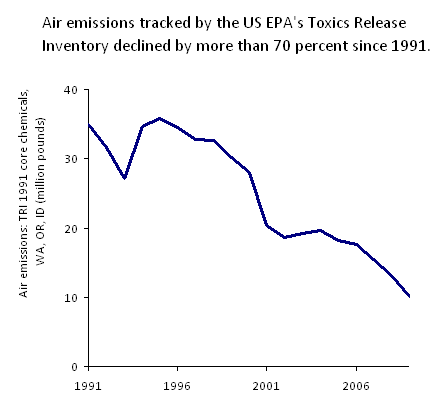A bit of good news for a sunny summer day: according to the US EPA’s Toxics Release Inventory, toxic air emissions in the Northwest States have fallen by more than 70 percent since 1991. Take a look:
The trends were fairly consistent: air emissions of the “1991 core chemicals” fell by about two thirds in Oregon and Idaho, and by three quarters in Washington. And the Northwest was hardly an exception: the US overall saw similar declines in air emissions.
There are obviously lots of reasons for the trends. Many factories have switched to cleaner technologies, or made other changes in manufacturing processes to reduce their emissions. More ominously, some kinds of manufacturing shifted overseas—and in all likelihood, some of the air pollution went with it. The recession is only a tiny part of the story, though; the pollution reductions from 2007 through 2009 were quite consistent with the declines in previous years.
Of course, it’s important to put the numbers in context. The TRI offers at best a limited snapshot of pollution trends. It doesn’t cover all compounds that could pose a risk, nor does it cover all sources of air emissions. And over the years, some critics have complained about the accuracy of the TRI data.
Still, the trends are genuinely good news—and highlight how important these kinds of disclosure laws are. Sure, there are many reasons why pollution declined; but the fact is that without the data collected by the TRI, many firms would have precious little idea how much they pollute, and even less incentive to point their trends in the right direction. Sometimes, all it takes to fight pollution is a little sunshine.
